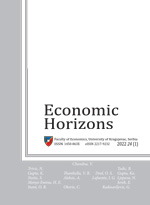THE EFFECT OF ECONOMIC GROWTH ON INCOME INEQUALITY IN SUB-SAHARAN AFRICA
Ibrahim Abidemi Odusanya
Olabisi Onabanjo University, Department of Economics, Ago-Iwoye, Nigeria
In this paper, the way in which economic growth influences income distribution is examined with a focus on Sub-Saharan Africa (SSA). Despite considerable growth in a number of the SSA countries, the region has been slow in reversing the rising trend of income inequality. A large proportion of countries in the region globally rank among economies with extreme income inequality. The study covers a period from 1995 to 2015, due to the limited data on the measure of income inequality, the Gini index, for the largest number of the countries of the region. The Generalized Method of Moments (GMM) system was employed in examining this paradox. The findings of this research study do not only suggest the presence of an inverted-U relationship between economic growth and income inequality, but the supposition of the S-shaped curve hypothesis in the interplay of growth and inequality was also tested and confirmed. It can be concluded that in no way do spurts in economic growth bring about diminution in income disproportion in Sub-Saharan Africa.
Keywords: economic growth, generalized method of moments, income distribution, Kuznets hypothesis, Sub-Saharan Africa
JEL Classification: C23, D33, F43, N47




